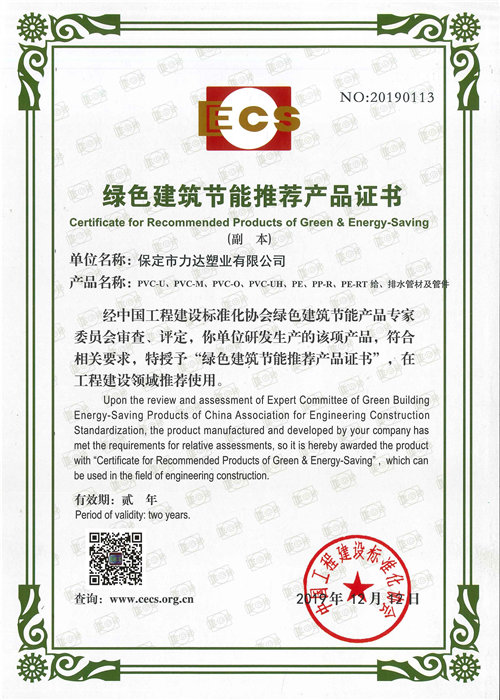Nov . 25, 2024 19:32 Back to list
Innovative Solutions for Durable CPVC Panel Applications in Modern Construction
Understanding CPVC Panels A Comprehensive Overview
In the construction and manufacturing industries, the demand for versatile and durable materials is ever-increasing. One such material that has gained popularity is CPVC, or Chlorinated Polyvinyl Chloride, particularly in panel form. CPVC panels are becoming a preferred choice for a variety of applications, spanning from residential to industrial uses, due to their unique characteristics and benefits.
What are CPVC Panels?
CPVC panels are constructed from a type of plastic that is modified from regular PVC. The chlorination process enhances certain properties of PVC, making it more heat and chemical resistant. The panels are lightweight yet durable, making them easier to handle and install. They come in various thicknesses and sizes, catering to different project requirements, and can be produced in a range of colors and finishes.
Key Advantages of CPVC Panels
1. Durability One of the standout features of CPVC panels is their exceptional durability. They resist cracking, chipping, and impact, making them ideal for environments with high traffic or potential wear and tear.
2. Chemical Resistance CPVC panels exhibit remarkable resistance to a wide range of chemicals, including acids, oils, and chlorinated compounds. This makes them suitable for use in chemical processing industries and settings where exposure to harsh substances is common.
3. Temperature Tolerance Unlike regular PVC, which can warp under high heat, CPVC can withstand higher temperatures, which adds to its versatility. This property is particularly beneficial in applications like hot water distribution systems and steam lines.
4. Moisture Resistance CPVC panels do not absorb moisture, making them an excellent choice for environments that are prone to humidity or wet conditions. This quality also helps prevent mold and mildew build-up, contributing to better indoor air quality.
5. Easy Installation The lightweight nature of CPVC panels simplifies the installation process. They can be easily cut, shaped, and attached without requiring complicated tools or extensive labor.
cpvc panel

6. Insulation Properties CPVC offers excellent thermal insulation properties, helping to reduce energy costs in buildings by maintaining temperature control.
Applications of CPVC Panels
Given their advantageous properties, CPVC panels find applications in numerous fields
- Construction CPVC panels are frequently used in building facades, ceilings, wall cladding, and interior partitions due to their aesthetic appeal and performance.
- Chemical Storage In industrial settings, these panels are ideal for rooms and containers where chemical storage is necessary, owing to their chemical resistance.
- Food Processing The panels’ non-porous nature makes them a suitable option for use in food processing plants, where cleanliness and hygiene are paramount.
- Marine CPVC's resistance to saltwater intrusion and corrosion makes it an excellent choice for marine applications such as boat building and repair.
Conclusion
CPVC panels present a versatile and efficient solution for a variety of construction and industrial requirements. Their durability, chemical resistance, moisture resilience, and ease of installation make them an ideal choice for architects, builders, and manufacturers alike. As the demand for high-performance materials continues to grow, CPVC panels are poised to play a significant role in the future of construction and engineering innovations. Whether you're considering them for your next home renovation or industrial project, CPVC panels offer a combination of practicality and versatility that is hard to overlook.
-
High-Precision PVC Rigid Sheets for Vacuum Forming | AI-Optimized
NewsAug.05,2025
-
Durable PVC-M Water Supply Pipes | 60-Year Life
NewsAug.04,2025
-
Premium HDPE Water Supply Pipes: Durable & Leak-Proof
NewsAug.03,2025
-
Premium PVC-M Water Supply Pipe - Durable & Efficient
NewsAug.02,2025
-
Premium PP Welding Rod: GPT-4 Turbo Enhanced
NewsAug.01,2025
-
HDPE Drainage & Irrigation Pipe - Durable, Efficient Solutions
NewsAug.01,2025

